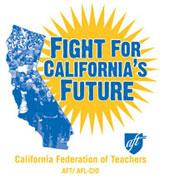With the passage of Proposition 30 in the November 2012 election, California is finally looking at improved prospects. Prop 30 begins the process of reversing the massive redistribution of wealth upwards that has taken place over the past thirty years. By imposing a 1–3% increase on the wealthiest Californians’ income taxes, and a modest sales tax increase of one-quarter of 1%, the state budget will gain some relief and programs in education and social services will not face further savage cuts.
But this will only be a beginning. Prop 30 will bring in approximately $6 billion per year for seven years. This is about half the chronic state budget deficit. After years of budget cuts, California now ranks close to the bottom among the states in almost any measure of how well we support public education and the other basic services of our state. There’s a lot more work to do in CFT’s Fight for California’s Future, an open-ended campaign since 2009 to educate the public about the real problems facing the state, and the real solutions that will fix them. Our work on Prop 30 was the most recent result of this campaign, which included educating the public about fair tax policies, passing Proposition 25 in November of 2010, and the March for California’s Future earlier in that year.
Four years ago the state budget was $102 billion. At that time California’s per pupil spending had already fallen to 47th in the nation. This year’s state budget was $87 billion. The public education portion of that budget, around 40%, has been proportionally reduced. Class sizes have soared in K-12. Teachers have fewer and fewer supplies. Support staff are being laid off. School bus routes are being eliminated, and the school year shortened in many districts.
In higher education, thousands of classes have been cut in UC, CSU and the community colleges, at a time when the Great Recession sent unemployment to the worst rates seen since 1940, at the end of the Great Depression, and economic refugees were seeking to take college courses to retool themselves. Students were unable to take classes they need to graduate. Part-time instructors have lost courses they taught for years, and as their teaching loads are being reduced, they are also losing their health benefits. The only “solution” offered by the UC Regents and CSU Trustees was to raise student tuition and fees, restricting access to higher education to those who needed it most. The Legislature increased community college fees by nearly 40%, driving away hundreds of thousands of students.
Prop 30 changed this picture, but we will continue to see anti-tax, anti-government forces attempt to undermine the public sector. When you hear them say “we don’t have the money to provide adequate public services,” they are wrong. If California were a country, its economy would be the eighth richest in the world. The problem isn’t a lack of money. The problem is the wrong priorities.
There are two parts to this problem. We have a tax system that does not ask those who have the most wealth and resources to pay their fair share—even with passage of Prop 30; and wealth has been massively redistributed in California and the nation over the past three decades — in the wrong direction. The top 1 percent of the economic pyramid own 34 percent of the wealth. At the same time, the very richest people are paying less in taxes and keeping more money for themselves than they used to. Their greater share of income, and lower tax rates compared to decades ago, equal the neglect and decline of our public services. Until recently, the general population has not realized how skewed the economy has become.
This arrangement was kept in place by undemocratic rules in the state constitution that allowed anti-government, anti-public education forces to block the will of the majority of the people of the state and the majority of the Legislature as well. With a two-thirds majority following the 2012 November election, pro-education forces in the Legislature may have a chance at changing the picture. But it will be up to all of us to make that happen.
The Fight for California’s Future seeks to bring together everyone who wants to protect public education and services. The CFT is working on building political coalitions with other unions and community organizations to bring new revenues to the state so that we may fund education and necessary services properly. And we are working to educate the public about who and what the obstacles are to a better future for all Californians.
This won’t change overnight. But with your help, it will change.
Fight for California’s Future!
— By Fred Glass, CFT Communications Director



